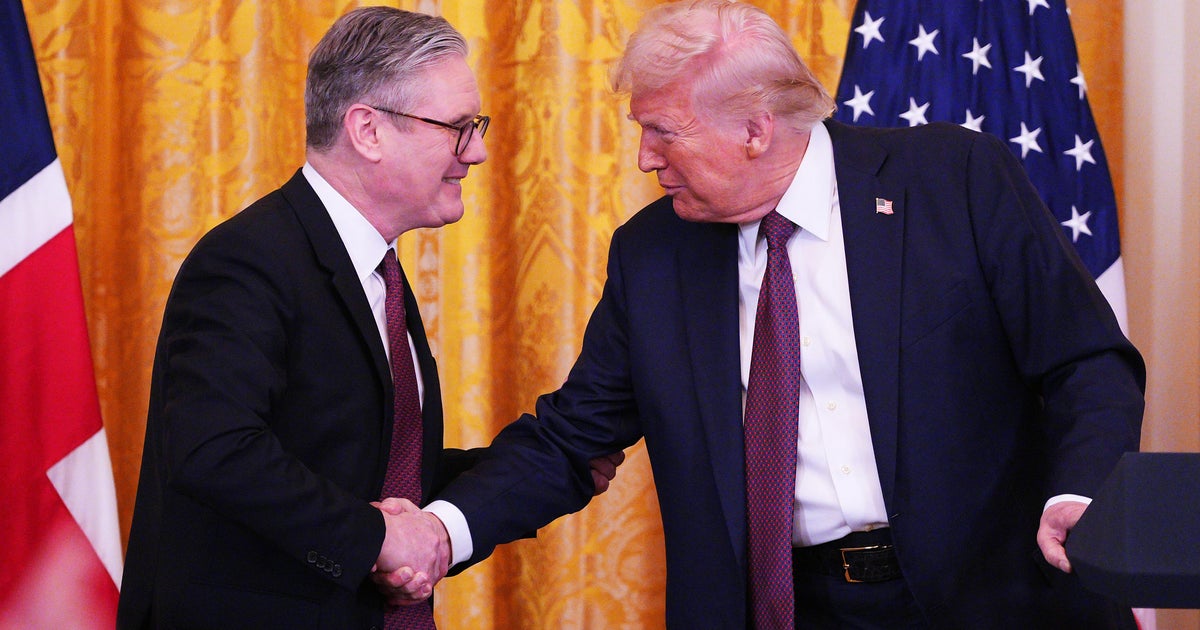President Trump claims that other countries and exporters to the U.S. will largely pick up the cost of tariffs. Yet recent data shows that companies are moving to pass along those added expenses to American consumers, threatening to push up prices.
According to recent survey data from Apollo Global Management chief economist Torsten Sløk and the Federal Reserve Bank of Dallas, for example, 76% of Texas manufacturers said they plan to pass tariff-related costs to consumers, while 50% say they will absorb costs internally. Large retailers have also warned that steep new levies on U.S. imports are likely to drive up prices.
"The bottom line is that inflation will be rising significantly over the next six months," Sløk wrote in a recent blog post.
To be sure, the impact of tariffs on the economy could fade if the U.S. manages to forge a number of trade deals in the weeks ahead, as White House officials have vowed. The Trump administration took a step in that direction on Thursday in announcing the framework for a trade pact with the U.K. that could result in lower tariffs on British exports to the U.S.
But with companies having to plan months in advance to account for tariffs, many companies are baking those costs into their pricing. In a recent EY survey of over 4,000 executives, two-thirds of respondents said they might have to pass tariff costs on to customers.
The Center for American Progress, a nonpartisan policy institute based in Washington, D.C., notes that the economic fallout from the Trump administration's tariffs will fall largely on low- and middle-income consumers. The levies could cost households an average of $5,200 every year, according to the nonpartisan think tank.
Inflation ahead?Manufacturers expect their prices to increase 3.6% over the next 12 months, up from up from 2.3% in the last quarter of 2024, according to a recent survey from the National Association of Manufacturers, which cites manufacturers' concerns over trade.
"Nobody has the profitability to be able to eat the tariffs," David Loftus, CEO of the Electronic Component Industry Association, an industry trade group, told CBS MoneyWatch. "So the manufacturers pass to the distributors, who pass to the customers."
A recent Gallup poll found that nearly 90% of Americans expect tariffs to drive up prices this year. For now, tariffs have yet to budge prices — the Consumer Price Index in March rose 2.4% on an annual basis, down from 2.8% in February.
Yet many experts say that U.S. tariffs, coupled with retaliatory measures from other countries, are likely to boost consumer prices in the months ahead.
"With the new tariffs now in place, we look for a shift up in inflation, adding a headwind to already slowing consumer activity and economic growth," Nationwide economist Daniel Vielhaber told CBS MoneyWatch in an email.
Goldman Sachs analysts estimate that core inflation as measured by the personal consumption expenditures index, which tracks consumer spending, to rise this year to 3.8%, up from 2.6% in March. Electronics and apparel are likely see the sharpest price increases, according to the investment bank.
Tariffs are taxes paid by importers, which must pay the fees to the U.S. Customs and Border Protection when it accepts shipments at American ports. As a result, U.S. businesses typically pass on most or all of that cost to consumers through higher prices, according to economists.
Mr. Trump has staunchly defended the tariffs as a way to restore fairness to global trade, reinvigorate U.S. manufacturers and generate federal revenues. When asked in a May 4 interview on NBC's "Meet the Press" whether higher duties on imports will drive up prices, he replied, "No. I think tariffs are going to be great for us because it's going to make us rich."
The president has also doubled down on his messaging that foreign exporters, not U.S. consumers, will absorb higher tariff costs. "China probably will eat those tariffs," Mr. Trump said in an April 29 interview with ABC News about the U.S. imposing tariffs of as high as 145% on Chinese goods.
At the same time, Mr. Trump has seemingly acknowledged that stepped-up tariffs could result in higher costs for some goods, such as toys. "Maybe the children will have two dolls instead of 30 dolls," he said in an April 30 Cabinet meeting. "And maybe the two dolls will cost a couple of bucks more than they would normally."
Some companies already hiking pricesAfter Mr. Trump on April 2 announced a 10% baseline tariff on U.S. imports, along with higher "reciprocal" tariffs on dozens of other nations, a flurry of companies across a range of industries have announced that they will increase prices to offset higher costs.
For example, power tool maker Stanley Black & Decker said in an April 30 earnings call that they implemented a "single-digit" price increase on retail partners in April and that they're eyeing another price increase.
"Given the magnitude of the current tariff rates, we are actively engaged with our channel partners about a second price increase, targeting implementation at the beginning of the third quarter," Chief Operating Officer Christopher Nelson said on the call.
The CEO of consumer products giant Procter & Gamble, the maker of Tide, Old Spice, Tampax and other household brands, told CNBC last month that price hikes are "likely" due to the uncertainty of tariffs. Adidas CEO Bjorn Goulden also told analysts in an April earnings call that there will be price increases in the U.S. market if U.S. duties on imported good remain in place.
"So should the duties go away, again, there will, of course, not be price increases," he said. "But I think we all agree that should these duties stay or even be higher, then, of course, it will cause a price increase in the market in general, not only in our category."
Chinese online retailers Shein and Temu said in April that they planned to hike their prices, citing the U.S. eliminating a tariff loophole for lower cost goods. Relatedly, Temu has stopped shipping Chinese-made goods to customers in the U.S. following the May 2 expiration of the so-called de minimis exemption.
Mary Cunningham







